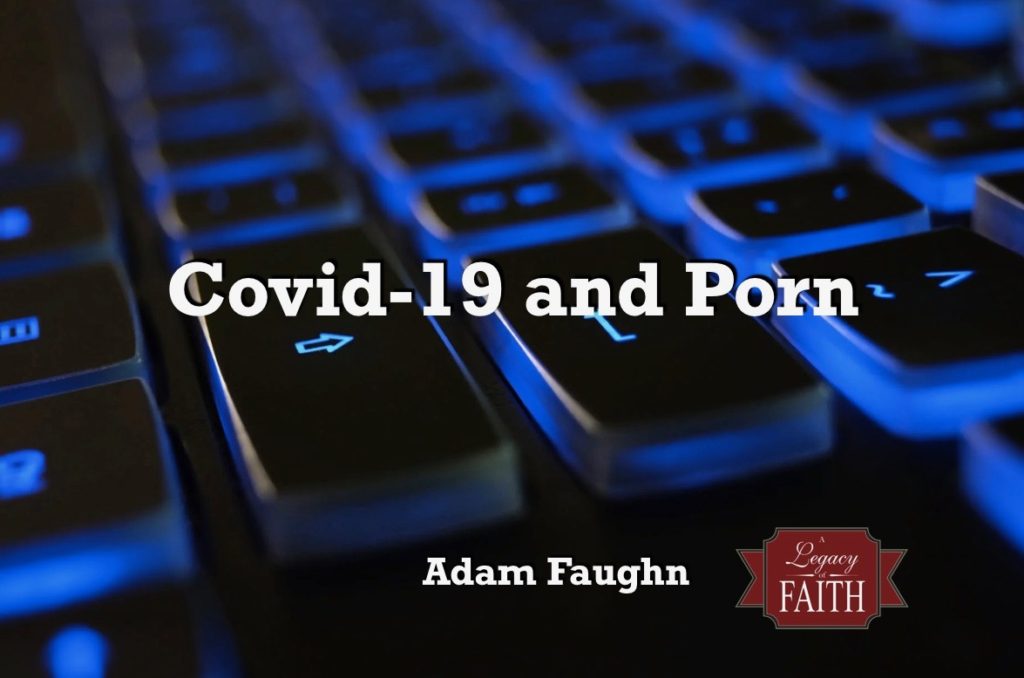Covid-19 and Porn

I keep hearing people say things like, “I’ve never seen anything like this before.” Well, unless you are over 100 years old and lived through the flu epidemic of 1918-1919, then that is certainly true. We are in very different times.
But that does not just mean living through a pandemic or being told to stay at home at such a grand scale. The differences of our times are also seen in the realm of technology. The breakneck pace of new, faster, clearer, and more realistic is simply amazing.
Much of it is good and is bringing us together. Facebook and Twitter have rarely been used for more positive purposes than they are right now. Zoom and similar sites are being used to stay connected, teach, and even preach.
But the other side of technology is also on the rise, and it is a horrific sign of our times. Since we are almost all at home–whether permanently or just for much more of our regular day–we are seeing an increase in the use of internet pornography.
And the increase is not a small one.
The largest porn site in the world recently boasted that, since the first stay-at-home orders were made, traffic on their site jumped by more than 11% (one article I read said 13%, but that has since been adjusted). They already had–are you ready for this?–42billion views last year, and social distancing this year is heavily increasing that number. [Source]
In addition, they are offering their premium “services” for free, and guess where they started that offer?
Italy.
That’s right, the nation that is being most wrecked by covid-19 thus far was the first to be gifted basically unlimited porn. From what I understand from the previously cited article, the same is now true in the United States. Interestingly, the Catholic Church–which obviously has a major view in the nation of Italy–also has grave concerns about what porn is doing during this time. [Source]
What does it say about ourselves that the use of pornography–which was already a massive problem, to say the least–would increase so dramatically when we are involved in such a horrible problem? While there are more sides to this than these, let me give two issues that are in play.
- Selfishness. At its most basic level, pornography is selfish. It is getting what I want when I want it the way I want it. But increasing our “use” of it during a time like this shows an even deeper level of selfishness. Many who are viewing more are supposed to be working from home. Others are neglecting time with their families, or time they could be using to check in on others who are having to stay at home. Instead, that time is being spent to fulfill our own lusts.
- Loneliness. Porn “fills” a space of loneliness in someone’s heart, but, tragically, it only leaves that person feeling more lonely when the time is over. Instead of connecting with a real person–or, even more importantly, God–they are “connecting” with a screen in order to fill that space in their heart. When the time is done, though, the realization kicks in that the screen is off, the person on the other side of the glass is gone…and the loneliness is still there. It is a tragic and sad cycle.
It is sad that these times are exposing not just so much good around us, but also some that is bad. This dramatic increase in porn consumption is clearly one of those bad things. It offers us an opportunity, though, to reach out to those who are struggling with relationships and offer wise and biblical counsel. It offers us an opportunity to chat, text, or facetime with someone to help them not feel so lonely. And it offers us an opportunity to teach more on the Lord’s perfect plan for sexuality for His creation. May we take those opportunities, even in these very different times.
To Receive Every Article from A Legacy of Faith through Email for Free, Click Here
AUTHOR: Adam Faughn


